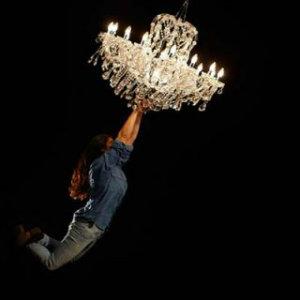The exhibition begins with an installation of hanging dolls by Sally Smart, alluding to the references of textiles, stitching and adornment as ‘women’s work’. This installation then leads to a work by Rebecca Bauman in which a ceiling-bound printer randomly spits coloured paper onto the gallery floor, acting as an allegory for emotive states of being and also hinting at the importance of pairings and relationships to a woman’s emotive state.
Also included in the exhibition is a room entitled ‘The After Party’ by Natalya Hughes, referencing Judy Chicago’s feminist work ‘The Dinner Party’, and including paintings and wallpaper rampant with symbols of eggs, tubes, ovaries and small pairings of beavers (the actual animals and not the analogy).
The exhibition continues with large paintings by Marie Hagerty featuring somewhat surrealist images of legs and torsos which at once bring to mind the sculptures of Hans Bellman; and an installation of intricate sculptures by Judith Wright which appear both playful and malevolent, with the fore-lighting of the works casting sharp, elongated shadows onto the gallery walls.
Contemporary Australia: Women is an entertaining and often intriguing exhibition that includes a number of significant works that instantly heighten the viewer’s consciousness of their own relationship with the work in front of them. It is these exceptional works that transcend the label of ‘women’s art’ and can be appreciated, not because they contain obvious and clichéd iconography or because they repeat tired feminist statements, but because they retain an identity of their own that is separate from gender or stereotype.
Contemporary Australia: Women
Gallery of Modern Art, Brisbane
April 21 – July 22





